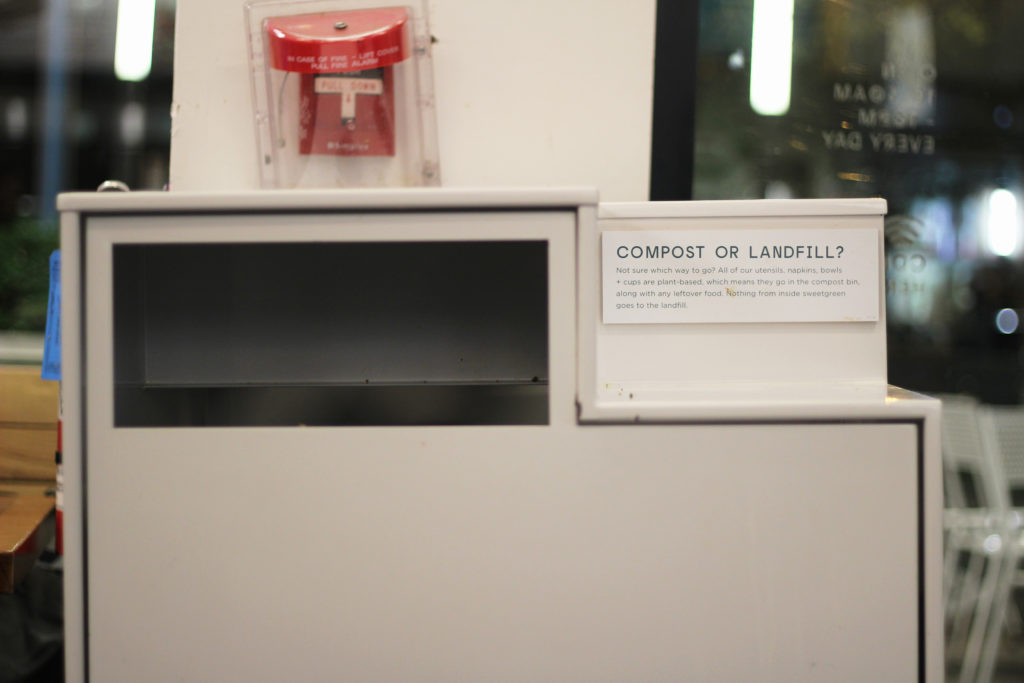Foggy Bottom restaurants could soon be required to compost food scraps.
D.C. councilmembers introduced the Zero Waste Omnibus Amendment Act of 2019 late last month, which would require restaurants to sort and process compostable material and only provide disposable silverware upon customer request. Foggy Bottom restaurant owners and managers said the bill would not impact their day-to-day operations because the restaurants already implement sustainable practices, like recycling and using paper straws.
Ward 3 Councilmember Mary Cheh, the lead introducer of the bill and chair of the Committee on Transportation and the Environment, did not return a request for comment.
Lindsay Walton – director of communications for D.C. Council Chairman Phil Mendelson, who co-introduced the bill – said Cheh will determine the timeline for the bill’s hearing.
“The chairman has been a lifelong supporter of legislation that seeks to reduce environmental waste and continues to support green initiatives for the District,” Walton said in an email.
Roza Nahar – the manager at CharmThai, a Thai restaurant on GWorld – said the bill would not affect the restaurant’s day-to-day operations because the joint’s staff already composts food scraps. The restaurant doesn’t give out plastic silverware unless customers ask for it, she said.
“When we say, deliver to residence halls, we don’t put plastic silverware,” Nahar said. “We only put plastic silverware if it’s for an office building.”
She added that the bill would not significantly alter her business’ practices, but the plastic straw ban introduced at the beginning of the year upped the amount of money she spent on straws. The D.C. Council passed a bill at the beginning of the year banning D.C. restaurants from using plastic straws.
“I mean, I can’t raise my drink prices because my paper straws are costing more, but that was a big hit,” Nahar said.
The Zero Waste bill follows the Sustainable D.C. Omnibus Amendment Act of 2014, which prohibits the use and sale of styrofoam containers for food service and requires disposable food service ware provided by restaurants to be compostable or disposable.
Donovan White, a shift lead at the Potbelly’s in Shenkman Hall, said the bill would be easier to implement at Potbelly’s rather than bigger chains like McDonald’s because Potbelly’s already implements sustainable practices, like recycling and using biodegradable straws.
“Potbelly’s is very flexible,” White said. “We didn’t have any problems with the straws or anything.”
He said the bill would ensure that restaurants are contributing to improve the environment.
“It’s actually a good idea because we’re trying to save the ozone and whatnot, and just protecting the planet as much as possible,” he said “This would be a good start, having restaurants do this.”
Stephen Murphy, a manager at Devon and Blakely, said the restaurant has already cut back on plastic by switching to paper straws and wooden coffee stirrers, but he still offers customers plastic utensils. He said the part of the bill that requires restaurants to only provide disposable utensils upon customer demand would create problems for customers because he includes plastic utensils in the bag.
“There are a lot of people that expect utensils to be in the bag already,” he said. “If we didn’t put utensils in the bag, I think there would be a lot of angry customers.”
Jeremy Pollok, a managing partner at Tonic said the restaurant already implements several sustainable practices like paper straws, recycling their oil and composting.
Pollok said Tonic works with the University to be as sustainable as possible, but the restaurant has faced some pushback from customers who did not like the switch to having to ask for straws instead of being provided one, before Tonic added compostable straws.
“Anything that we can do we try to do it,” Pollok said, “There’s people who don’t like it, believe it or not.”
Pollock said he doesn’t expect there to be as much push back from customers if he has to switch from plastic to-go utensils to more sustainable ones, because telling the difference between plastic silverware and biodegradable silverware is difficult.
“Some of these utensils that I’ve gotten they’re a little bit more expensive,” Pollock said, “But they’re just as good. I can’t tell the difference between our straw and a regular plastic straw.”





